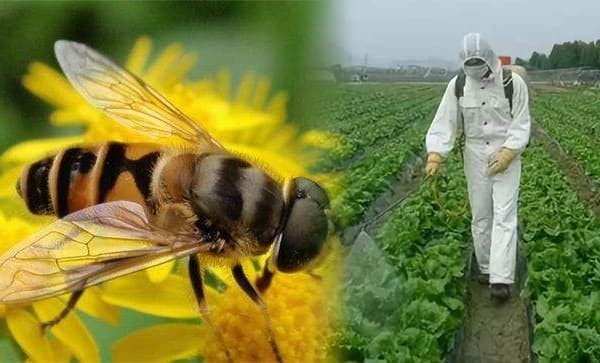The effects of pesticides (insecticides) on bee colonies cannot be ignored. Pesticides have been linked to the decline in bee populations around the world. Some insecticides are highly toxic to bees and can kill them outright. Others may not be lethal, but can still harm bees by disrupting their ability to navigate, forage, or reproduce.
Pesticides have long been known to be harmful to honey bees, but the mechanisms by which they impair bee growth are still not fully understood. Pesticides can damage the brains of honey bees, hinder their reproduction, and affect their foraging and navigation patterns. Some pesticides may also interfere with the bees' ability to process and store pollen, which is essential for their growth and development. The long-term effects of pesticide exposure on honey bee populations are still not fully understood, but it is clear that these chemicals can have a devastating impact on these important pollinators.
Recent findings suggest that neonicotinoids, a type of insecticide, can cause severe damage to bee behavior and reduce the ability of bees to reproduce, which in turn leads to impaired colony growth. Neonicotinoids work by attacking the central nervous system of insects, and bees are especially vulnerable to them because they consume large amounts of pollen and nectar, which can be contaminated with the pesticide. In addition, neonicotinoids can persist in the environment for years, so bees may be exposed to the pesticide long after it has been applied. The European Union has already banned the use of neonicotinoids, and the United States should follow suit in order to protect bees and other pollinators.
A common problem that many beekeepers face is the poisoning of their bees due to the use of pesticides. Pesticides are designed to kill pests, but they can also kill bees if they come into contact with them. This can be a major problem for beekeepers, as it can lead to the death of their bees and the loss of their honey crop.
The beekeeper has the responsibility of ensuring that his or her bees are not foraging on plants that have been sprayed with pesticides. This is important because the pesticides can be harmful to the bees and can potentially kill them. The beekeeper can do this by keeping an eye on the plants that the bees are foraging on and making sure that they have not been sprayed with pesticides.
If there are commercial farms near your hives, you may have to establish frequent contact with farmers and ask them if and when they spray. If the farmers are willing to work with you, they may be able to provide you with advance notice of their spraying schedule. This will give you time to protect your hives by moving them temporarily or covering them with a tarp.
Lawn gardens and urban backyard allotments can be sprayed with chemicals to kill pests and weeds. However, keep in mind that these chemicals can also be harmful to people and animals if they are not used correctly. Always follow the instructions on the label and wear protective clothing when using chemicals in your garden.
If you are planning to spray your plants with pesticides, it is important to take measures to protect your bees. You can either transfer your hives to another location, or block the entrance of the hive for a day, so that foraging bees will not be able to visit the plants.
If you see a high number of dead bees around a hive, it's possible they were exposed to pesticides. Other telltale signs include bees that can't fly, are crawling instead of flying, or a small number of foraging bees during a high season blooming period.
If you believe your colony has been poisoned, you should seek advice from local experts, your beekeeping association, and state authorities. Your colony may survive the poisoning or may not, but it is important to get professional help to ensure the best chance of survival.
